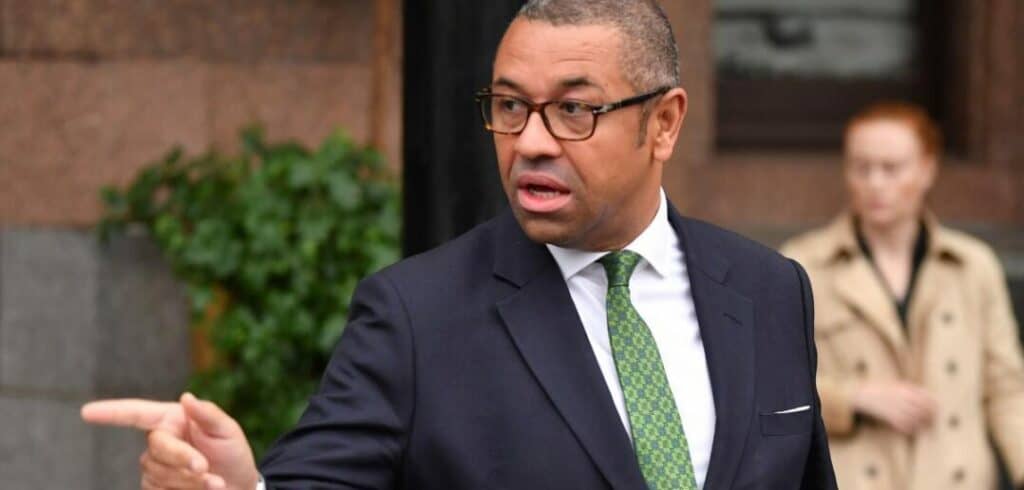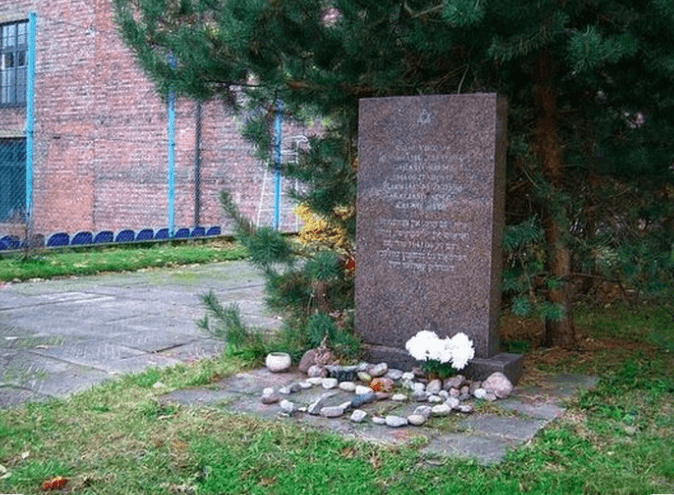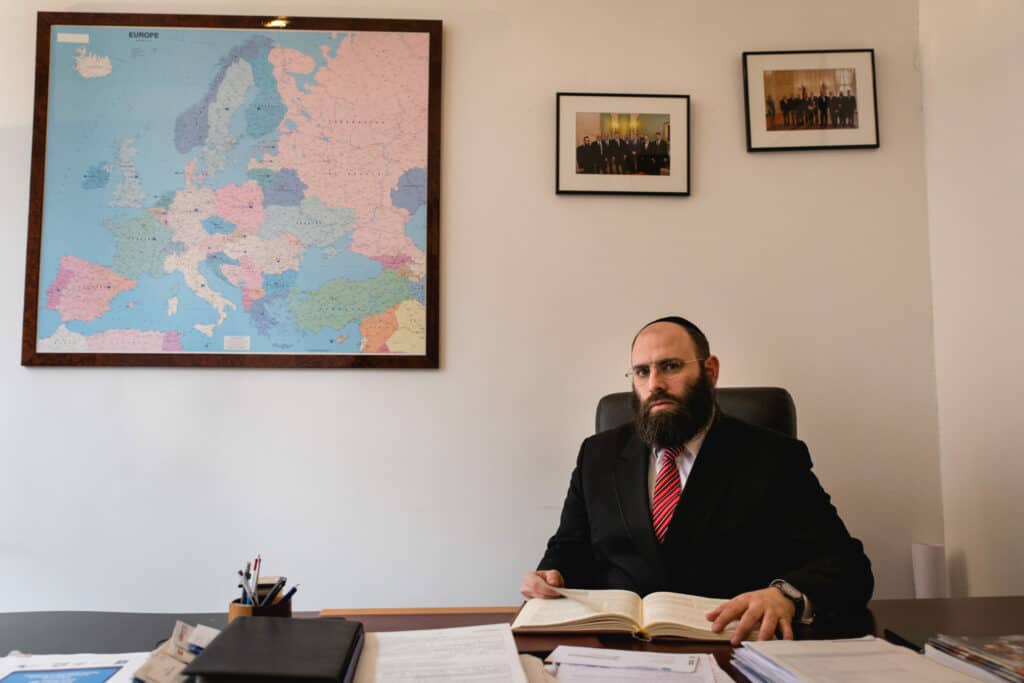
The British move came after a campaign waged by the country’s pro-Israel community, including the Jewish Leadership Council, Board of Deputies, Zionist Federation, the Conservative and Labour Friends of Israel groups, supported by a research from IMPACT-se, an organization that analyzes schoolbooks and curricula for compliance with UNESCO-defined standards on peace and tolerance, and briefings to policymakers.
Read more

What are they thinking? Tasteless tourists take sick selfies and BREAKDANCE at site where 10,000 Lithuanian Jews were murdered in one day by Nazis in WWII Kaunas massacre
Tasteless tourists who post pictures of themselves breakdancing, doing handstands and even performing ballet at a holocaust memorial site where 10,000 Lithuanian Jews were murdered by the Nazis in one day are being shamed online.
The shocking images were taken in front of the mass murder memorial at Ninth Fort in Kaunas, where 9,200 children and their parents were slaughtered on October 29, 1941.
They show tourists grinning happily alongside hashtags such as #happy – apparently oblivious to the gravity of the massacre that took place behind them.
Now activist Richard Schofield has collected the photos, posted under the hashtag #Ninth Fort, to shame the tourists involved and to show that young people are not being educated on the horrors of the Second World War.
Holocaust memorial campaigner Simonas Dovidavicius, former leader of the Jewish community in Kaunas, told MailOnline he was sickened by the holocaust selfie trend: ‘This is terrible. It shows how society is not in with what‘s happened.
‘This place cannot be a place of enjoyment and relaxation. I‘ve seen people sitting in the killing fields and having picnics or listening to music. People who were killed there deserve respect and some honour.‘
Rabbi Menachem Margolin, General Director of the European Jewish Association, told MailOnline: ‘It is one thing to take simple pictures of the memorial for the sake of remembrance, yet completely another to joyously pose in front of the camera with the place of mass slaughter in the background.‘
The killings at Kaunus were the biggest single massacre of Lithuanian Jews during World War II.
The condemned were lined up at death site and shot dead before being buried in freshly dug trenches. In total 50,000 Jews were murdered at the site, as Ninth Forth became a Nazi killing station.
But to the horror of 52-year-old campaigner Mr Schofield that brutal history has been has been erased and ignored by tourists to the site posing for light-hearted selfies.
Smiling for the camera, visitors pose in front of the memorial where the victims‘ bodies lay, seemingly unaware of the mass murders that took place there 75 years ago. Some tourists have been pictured doing handstands, jumping on victims‘ graves and even performing ballet.
Mr Schofield was prompted to take action by pictures like one of two teenage girls gazing into their camera for a selfie with the hashtag #Winterwonderland.
In another on the website two male friends grinned in front of the monument with the hashtags #happy and #day.
Another shows a man clinging onto one of the monument stones alongside the hashtag #hangingout.
Perhaps most disturbingly, despite museum bosses trying to discourage it, most of those MailOnline spoke to, knew what happened there – and didn‘t feel they were being contemptuous of its past.
Julija struck a model pose in front of the monument. She said: ‘I knew we were taking pictures in a place where thousands of people were killed.
‘But I don‘t think it‘s bad to make memories of visiting this place by taking pictures.
She added: ‘It‘s more bad mannered to take wedding or birthday pictures there.
Sarune posted a photo of her laughing in front of the monument – and said: ‘Taking selfies and photos isn‘t disrespectful. The place itself is full of monuments that are really beautiful so I think that it is normal to take photos.‘
Their views were shared by Gabriele, who posted a photo of her doing ballet at Ninth Fort on Instagram. She said: ‘It‘s not ill-considered to take selfies there. it‘s more important that nobody vandalises the monument and keeps it clean.‘
Rytis, the tourist pictured hanging from the memorial, admitted: ‘It lacks respect, I think, but I don‘t care about it too much, because it‘s a monument.‘
The museum‘s director Jurate Zakaite told MailOnline: ‘We try to stop selfies being taken because we think it‘s disrespectful to those who died here.
‘It‘s very strange that they know the history but still do it. If we catch them we ask them to stop. It‘s forbidden to climb on the monument.‘
Mrs Zakaite gave permission for Lithuanian rapper Vaiper Despotin to record a music video at the site because the song was about the number of people who had died there.
But the museum boss immediately regretted it when the video featured a Yeti and a woman in tight black leather trousers.
Julia Mozer, spokeswoman for the CEJI A Jewish Contribution to an Inclusive Europe which is based in Belgium, slammed the visitors‘ activities, telling MailOnline: ‘Taking happy selfies in front of Holocaust memorial sites is disrespectful and hurtful. Education that develops an appreciation for the impact of the Holocaust is absolutely essential. Memorial sites should also be monitored to prevent such exploitation.‘
Mr Schofield said his campaign to raise awareness, which includes going into schools to educate children about the holocaust to raise awareness has been positive.
The project is ‘designed to begin breaking Lithuania‘s dominant Holocaust taboo and to encourage the next generation of the country‘s leaders and decision makers to start dealing with this difficult subject,‘ he said.
‘We‘re not here to shame these young people. We know they‘re mostly good kids like most kids are. The problem lies with the Lithuanian State, which continues to let its young people down by not teaching them the full story of the Holocaust. ‘
Mr Schofield, from Newhaven, East Sussex, has been living in Lithuania 16 years. He is the former editor of a travel guide for Central and Eastern Europe and stayed in Lithuania because he liked it there.
As a photographer with a keen interest in history he began documenting Jewish life and became aware of how little was being taught about the Holocaust in schools and how little people knew about it.
He set up the NGO International Centre for Litvak Photography in 2015, one of the projects of which is Fifty Schools, which according to his website aims at working with ‘50 secondary schools around the country as part of an ambitious educational project to publish a unique e-book about Lithuania‘s sadly forgotten Litvak history, heritage and culture.‘
The article was published on the Stock Daily Dish

European Parliament President Roberta Metsola on Monday was awarded the King David Award by the European Jewish Association for “her support to the Jewish community in Europe,” the multinational body announced.
Metsola received the award after she visited the Auschwitz-Birkenau concentration camp to commemorate victims of the Holocaust.
During the visit, Metsola laid a wreath at the Death Wall and attended a memorial ceremony, the European Parliament said.
“I struggled to comprehend how a quiet part of the world, surrounded by beautiful Birch trees, provided the setting for the worst crimes man has ever seen,” Metsola said, adding that the entire world must know the “horror that stems from indifference.”
Metsola added that the King David Award “will serve to me as a continuous reminder of those heinous crimes committed against humanity in the past and to recall the importance of speaking up in defense of our common values today.”


Top European rabbi tells Israel Hayom a special center to monitor real-time incidents via remote feeds could be established in order to tackle anti-Jewish attacks.
The recent terrorist attacks in Austria and France, as well as the spike in coronavirus cases in Europe, has created a fear among Jews in the continent that anti-Semitic conspiracy theories blaming Jews for the spread of the pandemic could become mainstream.
A recent study in Germany showed that one in three Germans has somewhat of a conspiratorial view of the world.
Felix Klein, who is the federal commissioner for Jewish life in Germany and the fight against anti-Semitism, told Israel Hayom that the recent protests against the COVID-19 regulations have become fertile ground for anti-Jewish sentiment.
“The current protests against corona-related restrictions serve as a rallying point for antisemites, Holocaust deniers, and believers in conspiracy myths. At “hygiene protests”, participants downplay the Holocaust by, for example, comparing the current requirement to wear a face mask with the obligation to wear a Star of David during the Nazi regime,” he told Israel Hayom. “Portraying themselves as rebels – as do for example the supporters of the new political party Widerstand2020 (Resistance2020) and the Reichsbürger movement – is typical of adherents to anti-Semitic beliefs: Presenting oneself as breaking taboos, as ‘finally’ bringing the truth to light, as showing at last who is pulling the strings behind the scenes – and, as has been done for thousands of years, pointing their fingers once again at Jews,” he added.
When asked about the danger posed by such conspiratorial views, he noted that there is a concern verbal statements could eventually morph into action.
“Conspiracy myths also prepare the ground for violence, as history has shown. Those who perceive themselves as victims and feel threatened can themselves turn into a threat. Anti-Jewish pogroms throughout history have been the fatal consequence of such obsessive hatred of Jews, as have the antisemitic terrorist attacks worldwide in recent years,” he said. “A recent study has shown that radicalization online takes place four times faster than offline. That is what makes it so important to quickly adjust our laws. This is the thrust of the package of measures put forward by the federal government. I am confident we can achieve a lot through a combination of repression and education. After all, what is ultimately at stake is social cohesion in times of crisis.”
Meanwhile, Jewish groups have scrambled to deal with the threat of rising anti-Semitism in the age of coronavirus. The group “Concert – Together for Israel” strives to bolster Israel’s image and fight modern anti-Semitism, says its job has been made much more difficult in the wake of the pandemic, and many pro-Israel groups are facing potential elimination.
“Generally speaking, one can say that small organizations that rely on a small staff expect a slowdown and a long recovery, but the big organizations that need a large operation worry about their long-term viability in light of the added costs,” Nava Edelstein, the group’s program director says.
Rabbi Menachem Margolin, the head of the Brussels-based European Jewish Association that has led a comprehensive effort to counter anti-Semitism in Europe, told Israel Hayom that he has been overseeing a “virtual command center” that gets daily updates from Jewish communities on online anti-Jewish attacks.
“We constantly see how anti-Semitic voices on the web attribute the virus to a Zionist-Jewish conspiracy, on top over other forms of anti-Semitism that involve graffiti and vandalizing of Jewish institutions,” he said, adding the largest volume of reports originates in France, Romania and Belgium.
“We are considering setting up a center that would monitor events through Jewish communities’ video feeds in real time, so that we can alert security forces when such incidents happen,” he revealed.
The article was published in Israel Hayaom
It’s a challenging time for Jewish communities in Europe. Anti-Semitism is on the rise as populism and the politics of the lowest common denominator are gaining traction. Our communities often need round the clock protection and our practices and customs such as keeping Kosher are under pressure from increasing political interference.
| Cookie | Duration | Description |
|---|---|---|
| cookielawinfo-checkbox-analytics | 11 months | This cookie is set by GDPR Cookie Consent plugin. The cookie is used to store the user consent for the cookies in the category "Analytics". |
| cookielawinfo-checkbox-functional | 11 months | The cookie is set by GDPR cookie consent to record the user consent for the cookies in the category "Functional". |
| cookielawinfo-checkbox-necessary | 11 months | This cookie is set by GDPR Cookie Consent plugin. The cookies is used to store the user consent for the cookies in the category "Necessary". |
| cookielawinfo-checkbox-others | 11 months | This cookie is set by GDPR Cookie Consent plugin. The cookie is used to store the user consent for the cookies in the category "Other. |
| cookielawinfo-checkbox-performance | 11 months | This cookie is set by GDPR Cookie Consent plugin. The cookie is used to store the user consent for the cookies in the category "Performance". |
| viewed_cookie_policy | 11 months | The cookie is set by the GDPR Cookie Consent plugin and is used to store whether or not user has consented to the use of cookies. It does not store any personal data. |